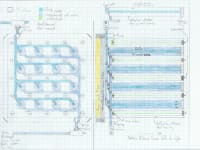What problem does your design idea solve?
What are the potential benefits?
How is your idea novel or an improvement on what is currently available in the marketplace?
Where would this idea be applied?
What is the market potential?
How does your design work?
How would your product be manufactured?
How would the production cost compare with products already in the marketplace?
1. The problem of fresh water shortages worldwide now and in the future, and high energy costs of desalination. Changes water from a finite source to an unlimited source by tapping into the other 97%
2. The benefits are that no one owns the ocean. Almost all of the world's oceans are deep enough for the deep sea reverse osmosis. No limit to human growth with unlimited fresh water resource.
3. My improvement over conventional reverse osmosis is that you don't have to pump water to high pressures, its already at high pressure because of the ocean depth. Pretreatment is easy and can be done automatically with no humans. Modular design allows production to be
scaled up enormously, produced easily and cheaply, and the boxes are replaceable.
4. This idea would be applied off the coast of any country with deep enough water, worldwide. 80% of the world population lives by the coast. The only companies that have the infrastructure to manufacture and distribute fresh water are oil companies with deep shore drilling rigs, tanker ships, and pipelines. The fresh water can be sold at a wholesale price to governments of other countries to distribute the water publicly at low cost to the citizens.
5. The market potential is that there are almost 7 billion people and they all drink water. and all the food they eat requires fresh water to grow.
6. Steps of operation
1) the water at the depth of operation would be at least 800 psi which is about 1800 feet below sea level.
2) water flows through a fine sand filter/charcoal filter to remove large particles.
3) an antiscalant will be pumped into the box right after the first filter.
4) the water is exposed to ultraviolet lights to kill any organisms or pathogens while the water flows from one side of the box to the other.
4) there the water enters the reverse osmosis cylinder chamber and flows in the opposite direction.
5) there are 2 pumps, one for the fresh water and one for the salt discharge water. the fresh water pump will create a negative pressure difference over the membrane, causing the high pressure sea water to flow through the membrane to equalize the osmotic pressure. the pumped fresh water is now less dense than the surrounding salt water for easier extraction.
6) pH adjustment->storage->distribution
7. The box would be manufactured with a robot assembly line with perfect welds to keep it water tight, the box is a cubic meter. The inside of the box and R.O. cylinder jacket are highly reflective to reflect the ultraviolet light all around the inside of box.
Like this entry?
-
About the Entrant
- Name:Dorian Miller
- Type of entry:individual
- Software used for this entry:none
- Patent status:none





